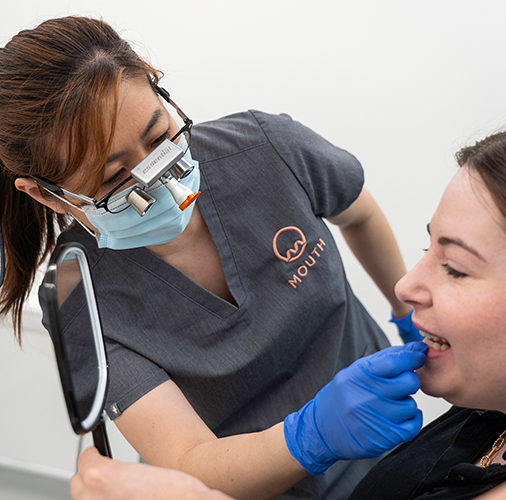
At Mouth Dental our Dental Crowns are made from durable, high-quality material that also looks natural and indistinguishable when restoring your smile.
Repair, reconstruct, and realign with dental crown treatment London
Natural-looking, indistinguishable dental crowns by Mouth Dental are made from durable, high-quality material. Our high-tech precision dental work and colour matching mean the restoration work is completely undetectable, and you will regain your beautiful smile. From minor to major repairing and reshaping, a dental crown can fix tooth damage and defects effectively.
Our patients receive the most advanced dental care available in the world for hassle-free, pain-free, and delay-free treatments. Fully equipped to carry out routine, specialist, cosmetic, and dental surgery, our clinics offer extended opening hours for your convenience. We care about what you want to achieve with your treatments and always enable results to meet your expectations. Taking on complex cases to bring exceptional results and choosing the most up-to-date treatment options for the simplest procedures, we pay careful attention to every detail.
By utilising digital dentistry, on-site printing, and three-dimensional scanning, you get cutting-edge dental care under one multi-clinic roof. Meet our highly experienced in-house specialists and consultants to understand your dental condition better and help you decide on the most suitable treatment option.
Dental Crowns: What are they?
Dental crowns are caps that resemble natural teeth that can fit over damaged and discoloured teeth, as well as dental implants. They are able to restore the shape, size, strength, colour, and appearance of a tooth. When fixed into place, a typical crown completely encases the entire visible portion of a tooth from the gum line and above. Dental crowns are usually made from metal, porcelain-fused-to-metal, all-porcelain, all-ceramic, pressed ceramic, and all-resin.

Treatable Cases


Meet your dentists

Dr. Shankar Bala
Dr. Shankar Bala is a dedicated orthodontic clinician with a decade of specialised experience in transforming smiles across all ages.
While Dr. Shankar has been awarded Platinum Elite Provider status for Invisalign—placing him among the top Invisalign providers in Europe—his expertise extends far beyond clear aligners. He is highly skilled in a comprehensive range of orthodontic treatments, including traditional fixed braces and other advanced techniques for patients of all ages.
After graduating in 2013 as a dentist, Dr. Shankar initially built his career in general and cosmetic dentistry. However, his passion for orthodontics took shape after becoming an Invisalign Provider in 2017. In 2019, he further deepened his expertise by earning a postgraduate certificate in orthodontics. Since then, he has successfully treated hundreds of cases, helping patients achieve straighter teeth and improved bite alignment with personalized care.
Dr. Shankar’s commitment to orthodontics is evident in his patient-centred approach, offering the latest techniques and customized solutions for every individual’s needs.
Why is a dental crown needed?
Dental crowns can correct numerous damage-related, colour-related, and shape-related teeth issues. Composite resin bonding can;
- A dental crown caps a damaged, broken, or worn-down tooth to give it full structure.
- It can protect a weakened tooth from breaking or hold together a cracked one in place. Tooth decay can make teeth fragile and easy to chip.
- To protect heavily restored teeth from breaking.
- When there isn’t much tooth remaining to support a filling, a crown can cover and support the tooth with the oversized filling.
- After tooth canal treatment, having a crown fitted to the tooth improves tooth survival rates.
- A dental implant needs a permanent crown to sit on top in the place of the missing tooth.
- Dental crowns hold a dental bridge in place.
- To discreetly cap badly discoloured teeth and misshapen teeth to enhance aesthetics.
- Crowns can also cover extremely sensitive teeth to help you take in food and drink without causing discomfort.
What types of crowns are available?
There are different types of crowns. Some are temporary crowns, and others are permanent crowns. Onlays and 3/4 crowns do not offer full coverage and are used when some of the underlying solid tooth structure still remains. Temporary crowns are put in until your permanent crown is ready.

Dental crown procedure step by step
First Step
At the first consultation, your dentist will examine the affected tooth or teeth. We take X-rays to assess the condition of the root and surrounding bone. When extensive decay or risk of infection or injury to the tooth’s pulp is detected, a root canal is performed to avoid underlying complications. With the help of local anesthesia, the tooth and its gum tissue are numbed. The outer layer of the tooth is reshaped along the chewing surface and sides to accommodate the crown without discomfort.
If the damage or decay gets extensive and the tooth can’t accommodate the crown, a filling material can build up enough tooth structure to support the crown.
Second step
With digital scanning, a 3D image of the newly shaped tooth is made. A copy of the surrounding teeth will also be made to ensure the crown will not affect your bite. A temporary crown made from acrylic will cover the tooth until the permanent crown is ready. It usually takes 2-3 weeks until your next appointment to fix the crown. On-site CEREC 3D printing is used for ceramic/porcelain crowns for same-day crown fitting.
Third Step
Once the permanent crown is ready, the acrylic crown will be removed, and the permanent one will be tried on. Our permanent crowns are made to comfortably fit and blend in with the natural colour of your teeth. However, it is important to ensure you are pleased with the appearance and fit of the crown. If you are happy with it, the permanent crown will be cemented in place. Local anesthetics will be used for the procedure.
Caring for your temporary dental crown
Your temporary dental crown protects your tooth from sensitivity and infection while keeping the tooth in its place without any shifts.
Therefore, caring for it ensures that it can protect your tooth as intended.
- Brush gently.
- Avoid sticky or chewy foods that can pull the crown off from its position.
- Avoid hard foods that can damage or dislodge the crown.
- When eating, transfer the bulk of chewing to the other side.
- When flossing, slide the floss out sideways instead of lifting it out.
Possible complications with dental crowns
A crown is an artificial addition that is useful in dental care. And complications can arise over time, which can be resolved with professional care.
Sensitivity or pain – A crowned tooth can be sensitive soon after the procedure as the anesthesia gradually wears off. A crowned tooth with a nerve still in it can experience heat and cold sensitivity. Toothpaste for sensitive teeth is recommended for brushing. If you feel sensitivity or pain when biting down, it usually means the crown’s fit is misaligned. Your dentist can put the crown back into place in such instances.
Chipping – All-porcelain or porcelain-fused-to-metal can sometimes chip. A slight chip can be repaired with composite resin while it remains on your teeth. If the chip is extensive, the crown needs to be replaced.
Loosened crown – A wiggly crown is a sign that the cement has washed out. A loose crown leaves room for bacteria to enter the tooth, causing decay. As soon as you detect a loose crown, contact your dentist.
Allergic reaction – Although rare, some develop an allergic reaction to the metal used in some crowns.
Dark line – You may sometimes see a dark line next to the gum line of the crowned tooth, especially if your crown is porcelain-fused-to-metal. It happens when the gum line recedes over time. The dark line is the metal becoming visible. It is purely a cosmetic snag and can be corrected by replacing the crown with an all-porcelain or ceramic one.
Gum disease – If gums around your crown are getting sore or starting to irritate and bleed, it could be gingivitis. Gum disease should be treated immediately.
How long do dental crowns last?
The general lifespan of a dental crown is between 5 and 15 years. Crowns made from gold and porcelain-fused-to-metal are known to last longer. Your oral hygiene and habits such as grinding and clenching teeth can affect the crown’s health. Biting hard items and nails also have negative impacts.
Does a crowned tooth have to be specially cared for?
No, a crowned tooth doesn’t need special care. However, good oral hygiene and practices are still necessary. Brushing and flossing around the crown help keep the underlying tooth protected from decay and gum disease. Avoid chewing hard foods on porcelain crowns.
How much do crowns cost?
Crowns can cost from £850 at Mouth Dental, depending on the material, condition of the tooth, and work needed to fit the crown.
We offer finance options for spreading out the cost of treatments for more expensive or long-term procedures. You can choose to pay for each session during your treatment period with our ‘pay-as-you-go’ option.
Our 0% interest-free finance over 12 months and 9.9 % interest for up to 5 years with Chrysalis Finance can help you with costlier procedures. Our reception team will be happy to share more information.
Book your virtual consultation
Begin your personalised smile transformation at Mouth Dental.
Book your free consultation with us now and let’s discuss treatment options to help you get that perfect smile!

Frequently asked questions
Why do I need a dental crown?
If you have a damaged tooth beyond restoration by dental bonding, a tooth mostly covered with a filling, a misshapen or discoloured tooth, a dental implant, a tooth that has had root canal treatment, or a dental bridge. Heavily decayed teeth can be saved without extraction by capping what remains of the tooth with a crown that functions and resembles a natural tooth.
Do dental crowns hurt?
Local anesthesia will be administered before the tooth is prepared and the crown is fitted. You may experience mouth dryness and slight discomfort during the procedure. Your jaw and the treated tooth may feel sore as the anesthesia wears off. This pain will go away on its own after a few days.
Is there an alternative to a dental crown?
Porcelain onlays are the most common alternative for dental crowns. Unlike crowns, these restore only the surface of a tooth. Inlays and porcelain veneers are other alternatives. The most suitable option should be decided based on the condition of the tooth/teeth under treatment.
How long is the recovery period?
The crowned tooth should start to feel normal after a few days. If the bite is not comfortable, your doctor will examine it and make necessary changes.
Can I replace my old crown with a new one?
Yes, if you previously had a crown fitted and want to change it for an improved one or replace an old one with a new one, it involves the same procedure. Once the old crown is removed, your tooth will be cleaned and prepared, and the new crown will be cemented in place. When there is tooth decay, a crown is removed to drill and fill, and then the tooth is capped with a new crown.
